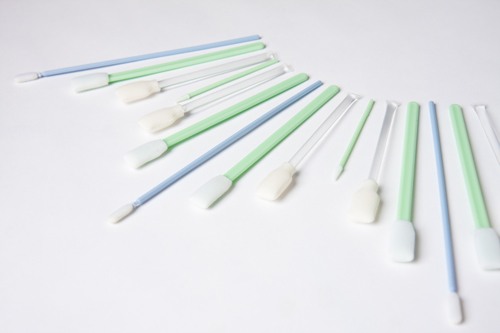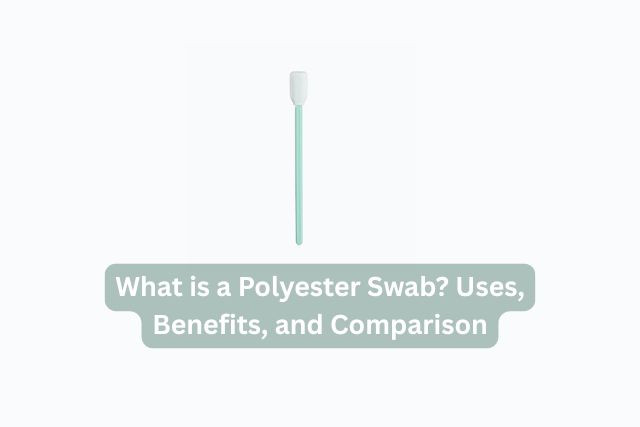Swabs
What is a Polyester Swab? Uses, Benefits, and How It Compares to Other Swabs
In environments where cleanliness, precision, and contamination control are essential, the type of swab you use matters more than you think. From medical labs to electronics assembly lines, polyester swabs are a trusted tool for tasks requiring accuracy and sterility. But what exactly is a polyester swab? How is it different from cotton or foam alternatives? Let’s dive deep into what makes this humble tool an industry staple.
What is a Polyester Swab?
A polyester swab is a cleaning or sampling tool composed of a polyester fiber tip affixed to a plastic or wooden shaft. The polyester used is typically non-woven or knitted, engineered for strength and minimal particle generation. Unlike cotton swabs, which can shed fibers, polyester swabs are lint-free, non-abrasive, and ideal for clean and controlled environments.
They are often used in sensitive settings where contamination must be avoided—such as in pharmaceuticals, medical diagnostics, electronics, and cleanrooms.
Key Features of Polyester Swabs
Lint-Free & Non-Shedding: Polyester material ensures no fiber contamination during use.
Chemical Resistance: Safe to use with alcohols, acetone, and other cleaning agents.
Non-Abrasive: Gentle enough for delicate surfaces like sensors or optical lenses.
Low Particle Generation: Suitable for sterile and ISO-classified cleanroom environments.
Thermally Bonded Tips: No adhesives or contaminants introduced at the bonding point.
Common Uses of Polyester Swabs
1. Medical & Clinical Applications
Polyester swabs are used in:
- COVID-19 and DNA sample collection
- Microbial surface sampling
- Wound cleansing
- Collecting throat or nasal specimens
Their sterile, inert nature ensures accurate diagnostic results and reduces the risk of false positives.
2. Laboratory & Pharmaceutical Industry
In regulated environments, polyester swabs are essential for:
- Environmental surface monitoring
- Equipment cleaning validation
- Residue collection on production machinery
They are compatible with many sterilization methods, including gamma irradiation and autoclaving.
3. Electronics & Industrial Cleaning
Polyester swabs are widely used to clean:
- Printed Circuit Boards (PCBs)
- Camera lenses, sensors, and semiconductors
- Barcode scanners and disk drives
Thanks to their non-scratching tip, they can remove microscopic dust and debris without damaging sensitive surfaces.
4. Cleanroom & Contamination Control
These swabs are certified for use in ISO Class 4–7 cleanrooms. They play a critical role in:
- Equipment swabbing
- Sterile manufacturing
- Quality control testing
Polyester Swabs vs. Other Swab Types
| Feature | Polyester Swab | Cotton Swab | Foam Swab |
| Lint-Free | Yes | No | Yes |
| Absorbency | Low | High | Medium |
| Cleanroom Compatible | Yes | No | Yes |
| Reusability | No | No | Sometimes |
| Chemical Compatibility | Yes | No | Yes |
| Tip Shedding Risk | Very Low | High | Low |
If you’re working in a controlled, sterile, or technical environment, polyester swabs are usually the top recommendation due to their precision and reliability.
Benefits of Using Polyester Swabs
- Consistent Performance: Same level of performance from swab to swab.
- Minimal Contamination Risk: No lint, low bioburden, and free of natural oils.
- Chemical Compatibility: Works well with alcohol, acetone, and other solvents.
- Wide Applicability: One of the few swabs usable across cleanrooms, labs, hospitals, and electronics.
- Available in Multiple Configurations: Head shapes (rounded, paddle, pointed) and shaft materials vary to suit different tasks.
How to Choose the Right Polyester Swab
When selecting a polyester swab, consider:
- Tip Size & Shape: Small tips for precision, large ones for broader coverage.
- Sterile vs. Non-Sterile: Choose sterile swabs for clinical and lab use.
- Handle Type: Plastic for flexibility; polypropylene or wood for rigidity.
- Packaging: Individually wrapped or in bulk depending on contamination sensitivity.
- Supplier Credentials: Always ensure the swabs are manufactured in compliance with ISO, GMP, or FDA guidelines for your specific use-case.
For example, if you need swabs for sample collection and want to access your kit online, use your Max Life Insurance Login or similar digital portals if provided by the supplier for order tracking and records.
Final Thoughts
Polyester swabs are far more than simple cleaning sticks. Their precision, cleanliness, and versatility make them a vital tool in high-stakes environments where the tiniest particles matter. Whether you’re ensuring a cleanroom meets standards or preparing medical samples for analysis, choosing the right swab—like a polyester one—can make all the difference.
Frequently Asked Questions (FAQ’s)
1. Are polyester swabs sterile?
They can be. Polyester swabs are available in both sterile and non-sterile forms, depending on the application.
2. Can polyester swabs be used with alcohol or disinfectants?
Yes, they are highly compatible with cleaning agents like isopropyl alcohol, acetone, and hydrogen peroxide.
3. Do polyester swabs shed fibers?
No. They are specifically designed to be lint-free and non-shedding, making them ideal for sensitive tasks.
4. Are they reusable?
Typically, no. Polyester swabs are single-use tools to avoid cross-contamination, especially in clinical and cleanroom settings.
5. How should polyester swabs be stored?
Keep them in a cool, dry, and clean environment in their original packaging to maintain sterility and integrity.
 Skip to content
Skip to content


